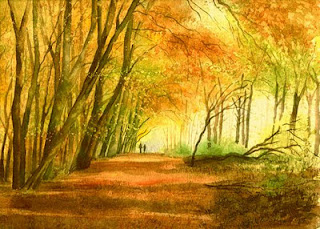During the past year, all of us have fallen short, and been less than the best people we can be. But we have also done some things well, and lived up to our potential as human beings. Many world religions have a special time of year, during which adherents "reflect on and evaluate their thoughts, words and actions over the past year [and] acknowledge their prejudices, negative behaviours and bad habits so that they may begin the process of transforming themselves." [Bhalodkar] The Hindu festival of Diwali is one, and the ten-day period leading up to the Jewish festival of Yom Kippur is another. It is a time "to celebrate and appreciate life and to look forward to the coming year with a renewed sense of purpose and passion." [Bhalodkar] For Christians, it is the period of Lent, but for the vast majority of people in Britain, who do not follow any particular religion, New Year is the time for reflecting on the past, and making resolutions for the future.
The process of self-examination is not an easy one. One of my favourite theologians is the wonderful Rabbi Lionel Blue, who I have been listening to on Thought for the Day for about 30 years. I have most of his books, which I have read and re-read, and was lucky enough to go and see him "live" a while ago. Over the years, he has taught me that the only thing that God wants frm us is for us to be more kind, more generous to everyone (including ourselves) and more honest, both with ourselves and our fellow travellers in the world. It is about listening to that inner voice, whether we call it God, or the light within, or our conscience, and about doing the right thing rather than the easy one.
My resolution for the coming year is to follow the advice of Rumi, in his wonderful poem The Guesthouse:
"This being human is a guesthouse
Every morning a new arrival.
A joy, a depression, a meanness,
Some momentary awareness
Comes as an unexpected visitor.
Welcome and attend them all!
Even if they're a crowd of sorrows,
Who violently sweep your house empty of its furniture,
Still, treat each guest honourably.
He may be clearing you out for some new delight."
























